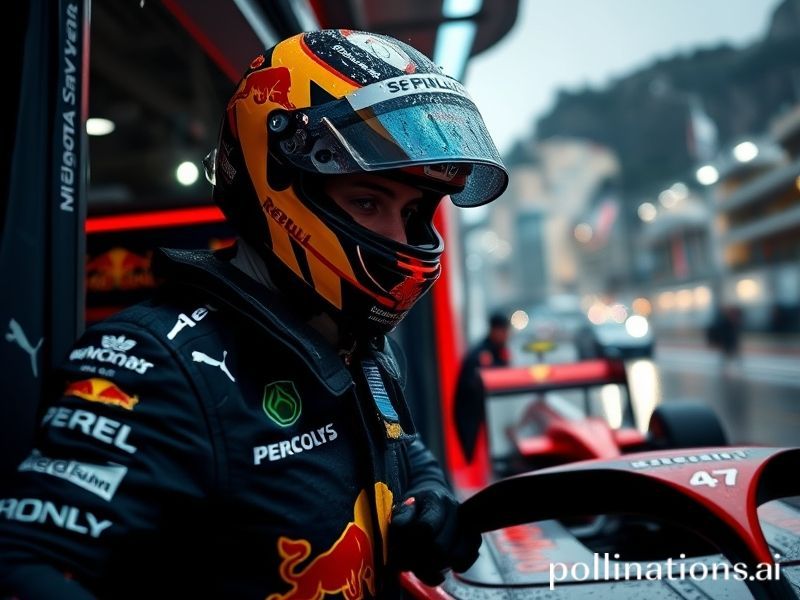Global Speed Freak: How Max Verstappen Became the 21st Century’s Loudest Metaphor for Everything
The Dictator of Decibels: How Max Verstappen Became the World’s Loudest Metaphor
By the time the Dutch national anthem crackled over the floodlit Yas Marina last November, Max Verstappen had already finished ruining the narrative arc for every other racing series on Earth. Formula 2, Formula E, IndyCar, and your nephew’s indoor kart league were all instantly downgraded to “quaint hobby.” From Jakarta to Johannesburg, the broadcast cut to a young man in orange overalls who looked like he had just remembered to be bored by immortality. The trophy weighed seven kilos; the geopolitical freight was heavier.
Let’s be clear: Verstappen is not merely fast; he is the living rebuttal to the notion that meritocracy died somewhere between nepotism and algorithmic hiring. Yes, his father was a journeyman F1 driver, which is the motorsport equivalent of being born on third base with a helmet already fitted. But over the past three seasons the son has turned that inherited pit pass into a clinic on controlled annihilation, winning 44 of the last 66 races—a statistic so absurd it sounds like it was faxed in by the North Korean sports ministry.
Globally, the implications are as noisy as the new generation of V6 hybrids are not. Liberty Media, the American conglomerate that bought Formula 1 for the price of a small war, now markets Verstappen the way McDonald’s markets salt: ubiquitous, essential, mildly dangerous in large doses. The Dutch Grand Prix, absent for 35 years, was resurrected in 2021 purely because Max exists; ticket demand crashed the national railway app—an irony not lost on a country that still prides itself on bicycles. Meanwhile, television rights everywhere from São Paulo to Seoul are negotiated around the promise that the blond lad from Limburg will still be loathed by at least half the audience. Hatred, after all, reliably outperforms admiration in the Nielsen ratings.
In the paddock, the other drivers have taken to existential cosplay. Charles Leclerc practices monastic acceptance; Lewis Hamilton experiments with zen Buddhism and environmental guilt; Lando Norris sells ironic merch about finishing second. Off-track, the sport’s regulatory body has begun legislating with the desperation of the Roman Senate trying to outlaw gravity: new floor heights, budget caps, wind-tunnel handicaps—each rule designed to make Red Bull’s car slightly less of a cruise missile. Thus far, the results resemble trying to slow down a glacier by yelling at it in Latin.
The broader significance is almost too on-the-nose. Verstappen’s dominance coincides with a moment when the world itself seems to be running out of plausible competitors: democracies sputter, supply chains snap, TikTok teaches us choreography for the end times. Watching one man lead every lap from lights to flag is weirdly reassuring; at least someone, somewhere, knows exactly what he’s doing. The Dutch have a word—efficientie—that sounds less sexy than the German Effizienz but gets the asphalt laid quicker. Max embodies that national trait, minus the politeness.
And yet, beneath the champagne facial and monotone post-race radio, there lurks a darker punchline. Formula 1 has pledged to be carbon-neutral by 2030, a promise about as credible as a tobacco company sponsoring a marathon. Red Bull’s pit crew now wears shirts made from recycled ocean plastic, presumably harvested between oil-barrel refuels in the Middle East. Every Verstappen victory lap is thus a lap around the small hypocrisies that keep late capitalism idling at 12,000 rpm.
So when the 2024 lights go out in Bahrain, note the global audience: insomniac Europeans, breakfast-slot Asians, and Americans who still think “safety car” is a euphemism for campus security. They are not just watching a race; they are watching one man compress the entire twenty-first century into 90 minutes of controlled combustion—equal parts brilliance, entitlement, and planetary guilt. Max Verstappen isn’t just winning; he’s accelerating the cultural moment until the tires squeal. And we, rubber-necking from grandstands or glowing rectangles, keep paying the entry fee. After all, someone has to keep the circus moving. The clowns have already unionized.







